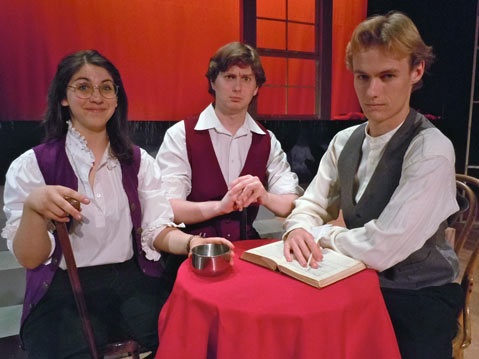1776 at Goleta Valley Junior High
UpStage Left Renders the Birth of Our Nation in Song

This wonderful production of 1776 will go down in history as one of the best and most heartfelt presents the United States of America got for its 235th birthday. By featuring young actresses in several of the major male roles, UpStage Left and director Cheri Steinkellner took a risk, and, like the Founding Fathers, did something that had never been done before. Although there was much more to the way this production succeeded than just the casting, there’s no question that the young women’s voices we heard here were at the core of what was so moving about the show. As John Dickinson—the stubborn, imperious loyalist from Pennsylvania and John Adams’s staunchest foe in the battle over independence—Christina Li was terrific. Her speeches, right until the last moment (when Dickinson leaves the room, broken but unbowed), were consistently exhilarating. As Benjamin Franklin, Dickinson’s fellow Pennsylvanian and the great compromiser who gets the deal done, Emma Steinkellner was wonderfully warm and real and handled the complex matter of a woman portraying Franklin’s masculine libido with candor and subtlety, rather than for shock or broad laughs.
The young men in the cast were equally successful, particularly Toby Tropper in the key role of John Adams. Tropper delivered his character’s arguments with verve, developed the role through physicality, and conveyed the affection between John and Abigail Adams (Alyssa Grant) with real tenderness. Grant’s voice was also a great asset to the production and added considerable power to several scenes, particularly the poignant “Compliments” in Act Two. Ray Cothern had the perfect distinguished but youthful glamour for his role as Thomas Jefferson, and Tad Murroughs brought just the right touch of antic energy to Jefferson’s fellow delegate from Virginia, Richard Henry Lee. The score of 1776 reflects a broad range of song styles, from the comic wordplay of “Lees of Old Virginia” and “But Mr. Adams” to the plaintive and heroic strains of “Momma Look Sharp” and “Molasses to Rum.” As Roger Sherman, Cameron Platt traversed the gamut, contributing with wit and expert comic timing to “But Mr. Adams,” and then reappearing as Leather Apron in Act Two to sing the melancholy “Momma Look Sharp” with Nanda Douglas as the Courier. Mia Burridge as Edward Rutledge (the youngest signer of the Declaration of Independence) made “Molasses to Rum” her own, stopping the show with emotional fireworks and a great voice.
Artists in theater are always looking for ways to create the same intensity and to provoke the same sense of lived reality that exists in the most dramatic moments in real life. In 1776, that excitement comes from observing the democratic process and wondering, no matter how well one knows the story, if the forces for independence will carry the day. Maybe it was the fine weather outside, the perfect blue summer sky and its message of glad tidings, or the proximity of this production to the actual Fourth of July holiday. Or perhaps it was hearing the strong voices of young women in the major roles. It might even have been the details of so many other performances coming together, as all 20 actors onstage gave everything they had to staying in the moment and living the story as though it were really happening now. In the end, it seems likely it was all of these things that made the miracle in Philadelphia come through loud and clear, and, when the Declaration of Independence was passed again, everyone in the theater sighed and smiled with recognition and joy.



